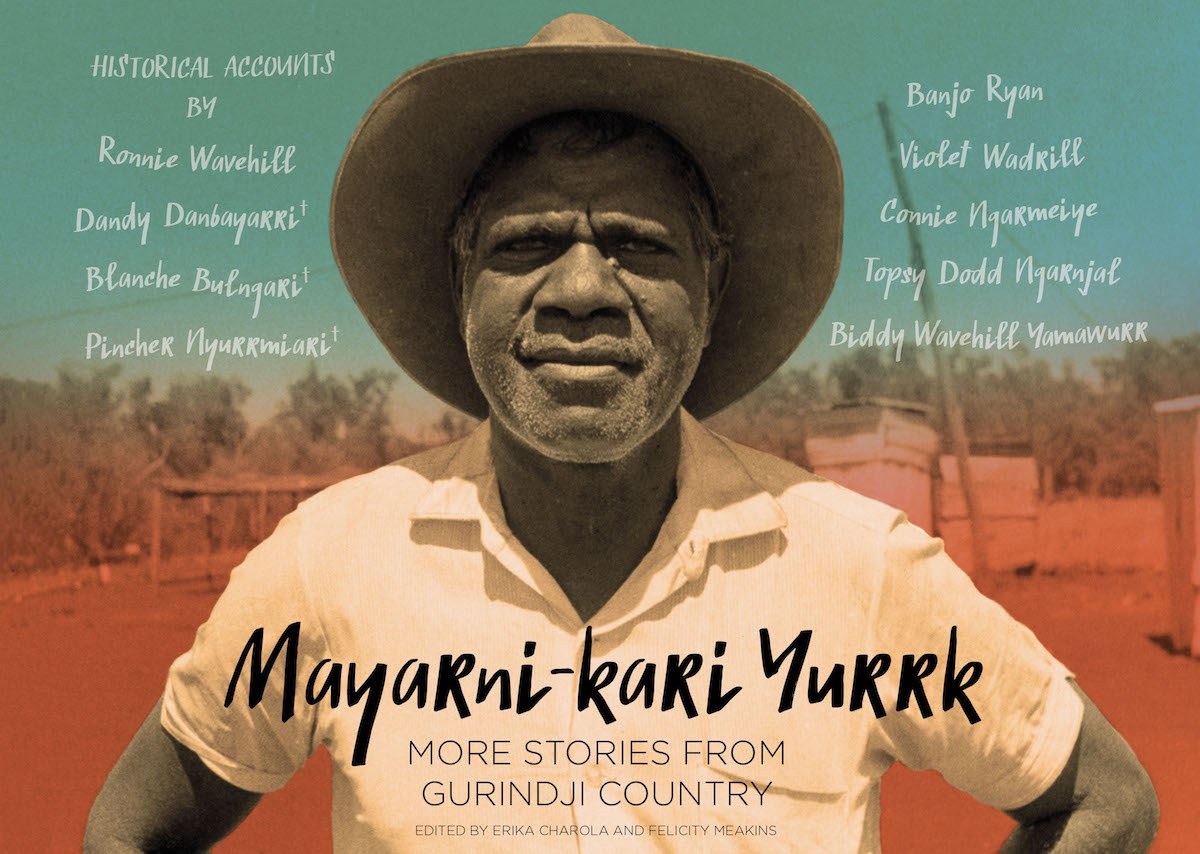

The latest release from Batchelor Press tells the story of the Gurindji people of Northern Australia. Their iconic Wave Hill Walk Off that marked the birth of the Aboriginal Land Rights movement is well-known, but until now little of their traditional culture and history has been published for a wider audience.
The book, titled Mayarni-kari Yurrk (literally, ‘More Stories’), was produced by the same collaborative team that compiled Yijarni: True Stories from Gurindji country (Aboriginal Studies Press, 2016). This volume contains stories from the early station days, Puwarraja (Dreamtime) stories, local accounts of regional legends, personal tales about Walk Off identities, and a series of anecdotes from a police tracker at Wave Hill (Kalkaringi) Police Station.
Historical accounts from Dandy Danbayarri, Ronnie Wavehill, Blanche Bulngari, Pincher Nyurrmiari, Banjo Ryan, Violet Wadrill, Biddy Wavehill Yamawurr, Connie Ngarmeiye and Topsy Dodd Ngarnjal are illustrated with historical and modern photos as well as artwork from one story-teller.
Gurindji culture has a strong oral storytelling tradition that fulfils many purposes: ceremonial, entertainment and the transmission of knowledge vital to survival. Mayarni-kari Yurrk details ancient and modern tales. It provides a captivating insight into the Gurindji perspective on history and some very personal stories of Aboriginal life in the Victoria River region before the modern era.
You can order a copy of the book here. Batchelor Press is the publishing arm of Batchelor Institute of Indigenous Tertiary Education and produces teaching and learning resources primarily for Indigenous Australian students living in remote communities, the majority of whom have English as a second or third language.
Below are some quotes and excerpts from the book:
‘Larrpa-ma karrinyani kula nyampayirlaaji yala-ma karrinyani, kula yanku yarrulan-ma kirringkurra-ma mamurung karrinyani kuya kamparrijang nguyilu yurrk marnani ngayu, ngayiny.’
‘In the old days they didn’t mix, you know. The young blokes didn’t go stay with the young girls; they were separate. They told me that’s how it was a long time ago.’
– Dandy Danbayarri on traditional sleeping arrangements, Kurraj (Rainbow Serpent) p11
‘Nyawa-ma nyawa-ma-ngalang yunparnu-nginyi, nyawa-ma pinka-ngarna. Karrmaninmanin pinka-ngarna kula-rla nyawa-ma lamarn-ta nyawa-rra-ma, pinka-ngarna nyawa-ma kankula waji-ma kuntirn-parla karrinya. Kurraj na imin there. Kurraj-ma karrinya kankula kuntirn. Kangka-ma purrminy-parlak, purrminy jangkarni.’
‘Here, here (the red-faced turtle) it’s come for us, and it’s been sung to carry a curse. It’s a creek- dweller. You don’t find it in big rivers, this kind. See that rainbow up there? That’s the kurraj! The kurraj was up there in an arc. It brings big winds too, strong winds.’
– Dandy Danbayarri, Kurraj (Rainbow Serpent) p12
‘Jei kamap an pikim up liptim up wan of dem karu- walija. Take it away kuya wi kaan ndim na.’ – (original in Kriol)
‘The mungamunga will appear and pick up one of the kids. They’ll take one away and we won’t find it then.’
– Connie Ngarrmeiye talking about the bush girls who stole her sister, Happenings on Cattle Creek p67
‘Ngu junani; wankaj nyila-ma kartiya-ma kuliyan, yuwanani nyila miyat-ma marlarluka.‘
‘He (the manager) used to swear at them. He was nasty, that whitefella. He swore at the old men, and at the full-ceremony men.’
– Dandy Danbayarri, Major, p84
‘Imin havem kujarra turlwak-kaji kanya, 44, revolver na kujarra, bullet-ma nyila purrp kanya. Yaluwu 44-wu bullet, revolver-wu bullet, purrp na kanya, karlarra-wu…’
‘He had two guns: the 44 and the revolver. He had both of them and bullets: bullets for the 44 and bullets for the revolver….’
– Dandy Danbayarri, Major, p87
‘Boxer, marntaj na, kula-rnangkulu nyampayirla parru na. Nyawa ngurnangkulu chuckem yuwarra.’
‘Okay Boxer. We’re not shooting you this time. We’re going to throw you into the water.’
– Dandy Danbayarri about Boxer, p109
‘Ngulu-rla wawurrkap la im wawurrkap la im wawurrkap la im na nomo nyantu- ma-rni. Imin only let ’im go-warla mirlarrang-ma, bikos ngunyunu yunparni yalungku na ‘parnkal-a jurru parnkal-a jurru karraku’.
‘Everyone ganged up on him, throwing spears at him. Loads of them were flying. But spears went right past him because he was singing a bat song to make the spear divert around him.’
– Banjo Ryan on Bony Bream’s magical defenses, Bony Bream p124
‘Pakarli nguyina ngurra-ma… Iron-ma nyampa-ma lawara ngulu manani mijipmijip wulawulaj nyampayirla-nginyi pulngayit-nginyi.’
‘Their houses were made of paperbark… The white people didn’t give them any housing materials before. They used to scrounge about for iron from the floodwaters.’
– Biddy Wavehill, Life in the Victoria River Bed, p148
‘Before nyamu-lu karrinyani tracker boy, and murnungku, you can go turlwak-jirri or not, shootem, kuya. Murnungku-lu anyone, kartipa-lu, you know.’
‘In the old days, when the police had trackers working with them, you could get shot if you weren’t lucky, by the police or by any kartiya (whitefella).’
– Ronnie Wavehill (with Dandy Danbayarri) on police work, A New Job at Maranboy and Two Tragic Murders p221
